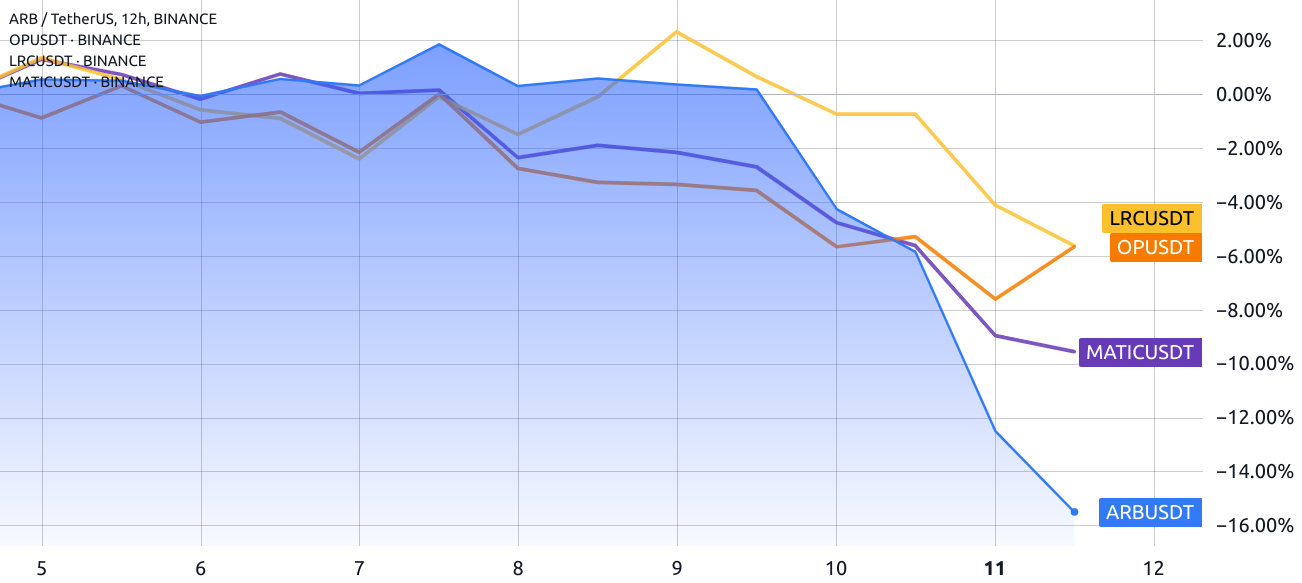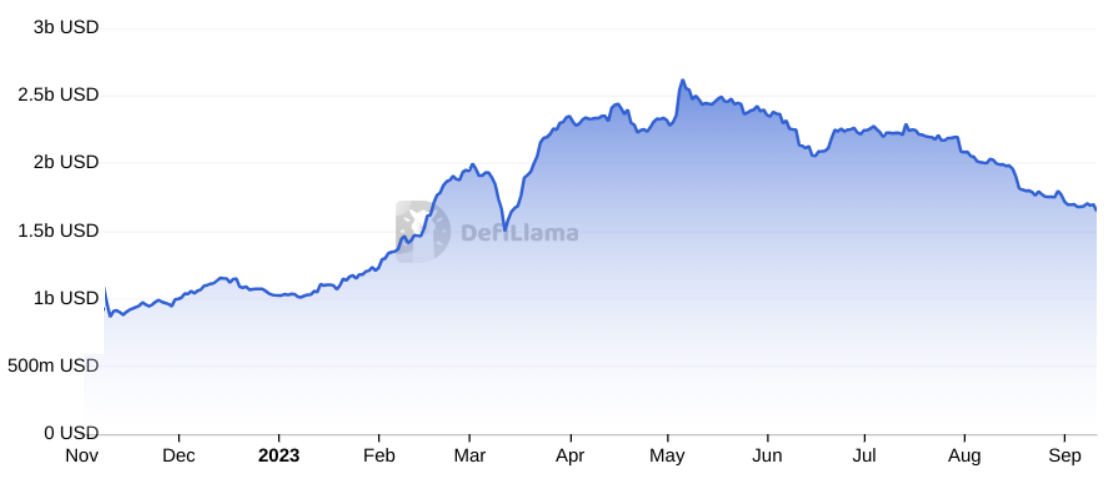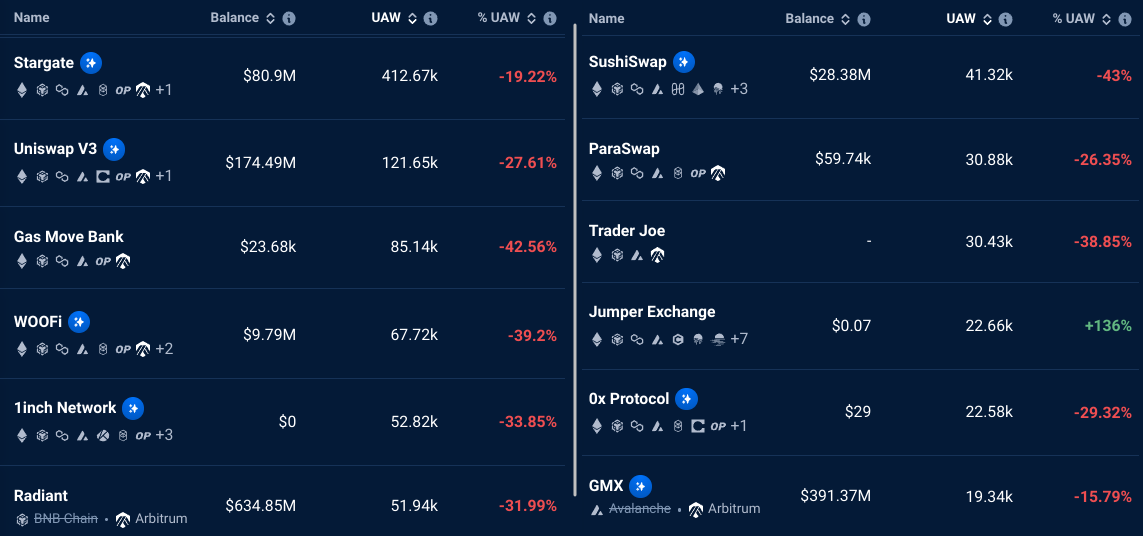Arbitrum (ARB) has emerged as a leading contender within the Ethereum network's layer-2 scalability solutions, boasting a significant total value locked (TVL) and notable activity. However, between Sept. 9 and Sept. 11, the price of ARB tokens experienced a sharp decline of 14.5%, marking its lowest point in history.
Investors are now eagerly seeking insight into the factors driving this movement and questioning whether Arbitrum still possesses the competitive edge, especially considering that irrespective of ARB token performance, the network TVL exceeds $1.6 billion.

It is worth noting that the past week has been challenging for most cryptocurrencies but among Ethereum's scaling solutions, none experienced a drop exceeding 9%, except for Arbitrum.
ARB governance proposals bring questionable benefits
One potential source of concern stems from the absence of any instances of fraud proof issuance since the launch of the Arbitrum mainnet in August 2021. Offchain Labs confirmed this information to Cointelegraph on Sept. 4. Developers, however, have explained that this situation aligns with the intended operation of the system, as validators with malicious intentions risk losing their entire stake. Consequently, this data is unlikely to have significantly impacted the price in the past week.
Additional factors that may help elucidate the recent price downturn are associated with governance proposals. The first proposal, posted on Sept. 2, aims to allocate up to 75 million ARB tokens from the project's treasury to address "short-term community needs" for active decentralized applications (dApps) within the ecosystem. However, even if approved, this allocation represents less than 2% of the DAO treasury holdings and is unlikely to have triggered the ARB token price correction, regardless of one's stance on the proposal.
Another governance proposal that has garnered attention was introduced on September 9th by PlutusDAO. This proposal seeks to return tokens from the DAO treasury to ARB holders through the activation of a staking mechanism, creating a native yield for participants, which could involve up to 2% of the total supply annually. Nevertheless, some investors view this inflationary approach as unnecessary and argue that it only exerts downward pressure on prices.
im not a VC so i'd "benefit" from this but..
— PSY (@PSYTWEAK) September 10, 2023
dilution through inflation would be a PVP proposal, instead of trying to bring more value into the ecosystem it extracts it from other ARB holders
Arbitrum is in a good position all round, one of the most popular chains, huge… https://t.co/IDpcdQfQHT
As user Psytweak highlighted on the X (formerly Twitter) social network, "dilution through inflation" does not contribute positively to the ecosystem, as it merely distributes DAO treasury holdings.
Beyond token governance, there are also concerns related to liquidation risks on both centralized and decentralized exchanges that offer leveraged trading. For instance, Lookonchain has observed a whale withdrawing ARB tokens from the Aave lending platform and transferring some to Binance.
A whale who is long $ARB on #Aave is selling $ARB to repay the debt.
— Lookonchain (@lookonchain) September 11, 2023
Over the past 5 hours, the whale has withdrawn 5M $ARB ($3.85M) from #Aave and deposited 3.8M $ARB ($2.93M) to #Binance.
And the whale currently holds 8M $ARB ($6.16M).https://t.co/HpuZnHbap4 pic.twitter.com/qduKeWC4ul
The challenge with this analysis lies in the ambiguity of cause and effect. Typically, leverage long positions are compelled to close when token prices have already fallen, rather than the reverse. This underscores the importance of investors examining Arbitrum's activity and deposit trends over the past couple of months, which could have potentially triggered the recent price performance.
Declining network activity is most likely the culprit
Arbitrum's TVL has notably declined to $1.67 billion, marking its lowest level since mid-February.

This 25% decrease over the past two months raises several concerns, primarily indicating a loss of investor confidence. This downturn has the potential to reduce liquidity and undermine the project's overall viability. Furthermore, it might deter new participants, impeding network growth and adoption.
Next, it's crucial to examine the number of active addresses within the network's top dApps.

There is a noticeable decline in 30-day active addresses, even among well-established dApps like Uniswap, 1inch, Radiant, SushiSwap, and GMX. Therefore, when considering the decrease in TVL alongside reduced user activity, it becomes evident that there is a substantial decline in demand for the network. While pinpointing a singular cause for this movement is challenging, one can speculate that competing chains such as zKsync Era and Coinbase’s Base may have contributed.
The data suggests that Arbitrum's 14.5% correction appears to result from a combination of investor dissatisfaction with the governance mechanism and the network's lackluster activity, despite offering significantly lower fees compared to Ethereum. Unless there is an upswing in transactions and an expansion of its user base, it is unlikely that ARB will be able to close the price performance gap with its competitors.
This article is for general information purposes and is not intended to be and should not be taken as legal or investment advice. The views, thoughts, and opinions expressed here are the author’s alone and do not necessarily reflect or represent the views and opinions of Cointelegraph.
 cointelegraph.com
cointelegraph.com
